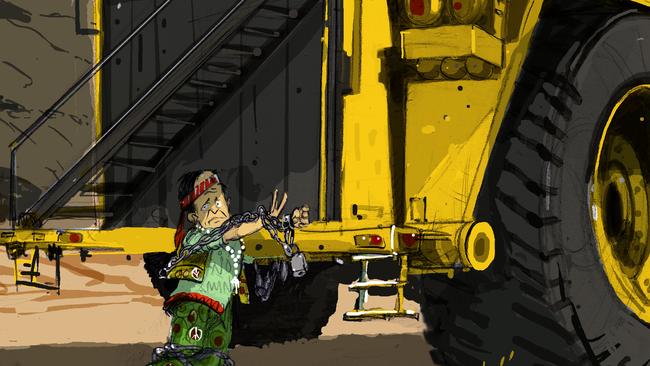
Only a pedant would take issue with the youthful crusaders who demand the University of Melbourne divest its fossil fuel shares. But take issue with them we must, since the language of environmentalism is not always what it seems.
Fossils, as described in the Macquarie Dictionary — “an impression or trace of an animal or plant of a former geological age” — are all but useless as fuel, not to mention damn difficult to find. When it comes to firing up a power station you’d be better off with the combustible remains of swamp forests that we like to call coal.
The second complication with the divestment argument is that the university doesn’t actually own shares of any kind, let alone dirty ones. Perhaps the university council should buy some, then sell them to satisfy the protesters, but in the era of wristband politics such a gesture is unlikely to satisfy.
The politics of climate change are increasingly disconnected. In April, for example, the Construction Forestry Mining and Energy Union took a stand against Labor’s proposed 50 per cent renewable energy target, to the satisfaction, no doubt, of its many members who dig coal for a living.
At the Labor conference in July, however, the CFMEU decided to support the RET proposal which, if implemented, could tip card-carrying coalminers out of jobs. What had changed in the intervening three months?
“The introduction of battery storage,” union president Tony Maher told the ABC’s 7.30. “Cheap battery storage in homes is very attractive to consumers and they’ll vote with their feet. And you’d be a mug not to see that.”
Could this be the same Maher who wrote a thundering letter to the ACTU’s Dave Oliver in April arguing that renewable energy targets were “poorly targeted and ineffective”? Is this the champion of the poor and dispossessed who argued that “low-income earners bear a disproportionate burden of these higher electricity costs”? Well yes, apparently.
The Labor movement would not exist without coal, the motive power of the industrial revolution and precursor to modernity. Without coal we’d be huddled around peat fires on the muddy banks of the Thames dying of dysentery instead of ordering pizzas on mobile phones and flying off to Noosa.
Today coal is wedging the workers’ party, separating the economic pragmatists who were once in charge from the kale chip-munching moralists to their left.
When Greg Combet was appointed minister for climate change he vowed to return “common sense” to the coal debate. “You don’t take the back of the axe to the fundamentals of the Australian economy,” he insisted.
“The coal industry is a very vibrant industry with a strong future.”
Yet when it comes to a choice between saving pay packets in Combet’s former seat of Charlton and saving Anthony Albanese’s hide in inner-city Grayndler, the party is following its usual path.
The Queensland Labor government, by contrast, remains committed to coal, no doubt mindful of the billions that would flow from the development of the Galilee Basin. Annastacia Palaszczuk and Tony Abbott don’t agree on everything, but on the question of removing green tape for miners they are pretty much in lock-step.
State and territory administrations have happily signed up for the Abbott government’s proposal for environmental approval one-stop shops, rolling state and commonwealth approvals into a rigorous but simpler process.
Removing unnecessary regulatory hurdles will reduce the opportunities for legal activism. Tree hugging has fallen out of favour. Today, environmental campaigners prefer Armani suits to tie-dye. They are less likely to be found in rainforests than in the courts. Their stated aim is to delay approvals for as long as possible in the expectation that the miners will cut their losses and walk away.
Which brings us to Adani’s proposed Carmichael coalmine, potentially the largest in Australia. If approved, we could be exporting thermal coal from Carmichael until the end of the century.
Last week The Age ran the headline: “Federal Court overturns approval of Adani Carmichael coal mine”. It hadn’t, as it happens; it had simply asked to see more paperwork. Commonwealth lawyers had turned up with truckloads of documents but had neglected to bring conservation reports for the yakka skink and the ornamental snake.
A Labor Party that cared about prosperity, not to mention ordered process, would be opposed to these job-destroying judicial frolics. They would recognise that wealth is created from the seats of bulldozers, not the seats at the bar. Yet Labor has taken the foolish step of opposing Environment Minister Greg Hunt’s one-stop-shop legislation in the Senate, to the delight of the Greens.
“We are absolutely thrilled that the Labor Party have now changed their view,” Greens senator Larissa Waters told the Senate. “We really welcome that and thank them for that.”
The iron law of triangulated politics is that when Labor policy moves closer to the Greens, the task becomes easier for the voters. Labor’s opposition to Hunt’s reforms gives voters a choice between a party that wants to limit the scope for Green mischief in the courts and one that is prepared to indulge it. It is a choice between a party that thinks Australia’s energy future lies with windmills and batteries, and one that prefers to create energy at half the price by mining our abundant supplies of coal.
“If Mr Abbott wants to make the next election a contest about who has the best policy solution for climate change. I’ve got a three-word slogan for him: Bring it on!” Opposition Leader Bill Shorten told the Labor Party national conference last month.
He’s going to have to do better than that.
Nick Cater is executive director of the Menzies Research Centre.


